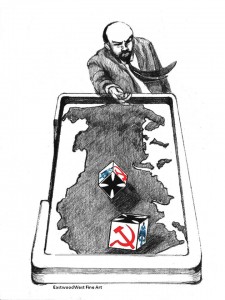Fool Russians Where Engels Feared To Tread
Posted in General, On This Day on November 7th, 2014 by Eugene Finerman – Be the first to commentNovember 7, 1917: One Day That Shook the World (John Reed padded the rest)
 Under the tsars, the Russian people were oppressed by good-looking imbeciles with flawless table manners. Vladimir Lenin envisioned a new world in which tyranny would be based on pathology rather than pedigree. However, Russia was not ready for communism during the first decade of the century.
Under the tsars, the Russian people were oppressed by good-looking imbeciles with flawless table manners. Vladimir Lenin envisioned a new world in which tyranny would be based on pathology rather than pedigree. However, Russia was not ready for communism during the first decade of the century.
According to Karl Marx, the Revolution would occur in an advanced industrialized society in which the workers starved but read Hegel. In the early 20th century, Russia was still perfecting feudalism. Lenin became resigned to a life in exile, playing chess in Switzerland.
In 1914, after decades of extravagant militarism, the European powers surprised themselves by having a war. To protect Serbia from Austria, Russia went to war with Germany. (To protect Austria, Germany attacked Belgium. If anyone had possessed a sense of direction, it wouldn’t have been a world war.)
Russia couldn’t even supply all of its soldiers with rifles. In 1915, 25% of the Russian troops at the front were unarmed; they had to wait to inherit the guns of dead soldiers. At least the tsarist government demonstrated even-handed incompetence by neglecting civilians. The transportation system broke down, and the cities went without food and fuel.
By March 1917, the civilians were rioting and the soldiers mutinying. Tsar Nicholas II was at the front “inspiring” the troops. His imperious majesty would have been safer with the Germans. He found himself under arrest and confronted with a delegation of government officials demanding his abdication.
Thus, a new and liberal government came to power in Russia. All those cultured, sensitive souls from Chekhov plays were running the country. This provisional government commanded the fervent support of millions; unfortunately, none of them were in Russia. What is freedom of the press to a nation of illiterates? The provisional government inherited chaos and chose to perpetuate it. Although the world war had toppled the monarchy, the new government intended to keep Russia in the carnage. The Russian masses were ready for any leader or ideology that ended the war, and Lenin took this as his opportunity.
In late March 1917, Lenin walked into the German consulate in Zurich and offered to overthrow the Russian government. He must have learned the word “chutzpah” from Leon Trotsky. Lenin peddled the Bolshevik Revolution essentially as an initial public offering. If Germany provided him with the start-up capital for his venture, he would seize control of Russia and withdraw it from the war. Germany could then shift its eastern army to France and, with that additional million men, bludgeon its way to Paris and victory.
Though Lenin’s scheme was preposterous, the Germans were receptive to gruesome ideas. The Second Reich had already pioneered submarine warfare and poison gas, so it was willing to invest in proletarian uprisings. Germany provided the train and traveling expenses for Lenin and his cadre of Bolshevik exiles. They arrived in Russia in April 1917; they were in control by November. Today is the anniversary of their coup.
There was no one to defend democracy in Russia. Russian liberals made excellent novelists, but their idea of defense against a Bolshevik onslaught was to make a sarcastic remark in French. The Bolsheviks’ seizure of Petrograd was so boringly bloodless that Soviet film makers had to concoct battle scenes for the sake of drama. Most of the liberals survived the revolution (even Lenin thought that they were too amusing to kill) and ended up as tenured professors at Ivy League schools.
Lenin had promised peace to Russia. Indeed, the Russian army assumed that a promise was as good as a treaty; the soldiers began an impromptu retreat home. Germany, however, was not ready for peace. While it had achieved victory in the East for the price of Lenin’s train fare, Germany now wanted more for its investment. The Second Reich demanded control of Poland, the Baltic States, Finland and the Ukraine. Russia would lose 27% of her arable land and 73% of her coal fields. For all practical purposes, the Baltic Sea now would be a tributary of the Rhine. Lenin had no choice but to capitulate. An unopposed German army can be very persuasive.
Fortunately for Lenin, Germany never collected on the debt. There still was a Western Front, and Germany’s first encounter with Captain George Patton and an American army would be the precursor for the main event. While Germany was whimpering about the Treaty of Versailles, it was in no position to enforce its juice loan to the Soviet Union. Nevertheless, Germany might have taken some satisfaction from subsidizing the Bolshevik state. After all, someone had to threaten Western civilization, and if it couldn’t be Germany, why not the Soviet Union?
Comicsar Yevgeny